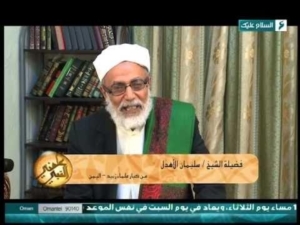The Trodden Path (Episode 11): Shaykh Sulayman al-Ahdal
In this series, Shaykh Shoayb Ahmed of South Africa will take us on a journey through the lives and biographies of some of the most celebrated and well known scholars of the twentieth and twenty – first century. These historical accounts will provide us with refreshing insights and lessons, and motivate us to follow in the footsteps of our pious predecessors.
In this eleventh episode of the The Trodden Path series, Shaykh Shoayb Ahmed writes on the life of Shaykh Sulayman al-Ahdal of Yemen.
 Shaykh Sulayman al-Ahdal (1365-1440=1946-2019)
Shaykh Sulayman al-Ahdal (1365-1440=1946-2019)
Sulayman ibn Muhammad Abdul Wahhab al-Ahdal grew up in the city of Zabid in Yemen. This city was known as the city of knowledge throughout Yemen and was regarded as the leading city with regard to scholarship in the Shafi madhhab. In fact, much of Yemen relies on the fatwa that is pronounced by the Mufti of Zabid. A unique feature of this city is that whenever students from other parts arrived here to study, they were welcomed and very soon settled in the city and even married in the city and resided there. Some of the renowned scholars who were lived in Zabid were the author of al-Qamus al-Muhit, al-Fayruz Abadi and the author of Taj al-Urus, Muhammad al-Hasan Murtada al-Zabidi.
Shaykh Sulayman was born in 1946 (1365) into a prominent family with a rich legacy of scholarship. In addition, the family lineage links up to the Prophet Muhammad through his grandson, Hasan ibn Ali.
Shaykh Sulayman commenced his education by studying the Quran with the jurist, Sa’id al-Mikhlafi, the modes of recitation of the Quran with Shaykh Muhammad Sa’id. In addition, he studied the basics of calligraphy and mathematics.
He gradually progressed in his studies. So in fiqh, he began with Safinat al-Najat, Abu Shuja’, al-Zubad and Minhaj al-Talibin. The student was at liberty to select the subject that he wished to specialize in and the scholars guided him along his way and quest for knowledge without interfering in his choice. Initially, the student studied along the foundational subjects that a student required. These included Arabic grammar, Tafsir and Bulugh al-Maram.
Shaykh Sulayman devoted himself to his studies. They began studying from before Fajr until sunrise. Others spent most of the day studying, only stopping for sleep. Students vied with one another in their acquisition of sacred knowledge. The students never sufficed with a mere overall understanding of the book, but rather they concentrated on understanding the entire book. A text like al-Ajrumiyah for example was studied with ten different scholars because every scholar had his own unique style and manner of explaining the lesson. Thus, they benefited even more. Shaykh Sulayman excelled and he was known as the ‘young Shafi’.
Some of his Shuyukh were:
- Shaykh Muhammad Siddiq al-Battah
- Shaykh Muhammad Ahmad (Hanafi jurist)
- Shaykh Muhammad Ahmad al-Salimi
- Shaykh Muhammad Sulayman al-Idrisi with whom he studied al-Minhaj and most of the six books of Hadith.
- Shaykh Ahmad Abdullah al-Khalil
- Shaykh Abkar Abdurrahman al-Mahadilah
- Shaykh Muhammad Abdullah Bazi with whom he studied Arabic literature and rhetoric.
- Shaykh Ahmad Muhammad al-Khatib
- Shaykh Asad Hamza Abdul Qadir
- Shaykh Khalid al-Shar’abi
- Shaykh Ahmad Ali al-Sadat al-Sahbani with whom he read and studied Manzhumat Mughni al-Labib and al-Dhari’ah.
- Shaykh Ahmad Dawud al-Battah with whom he read much of al-Irshad. With this teacher, he gradually progressed in his study of fiqh until he reached al-Minhaj. He attended his lessons on the Sahihayn and the Sunan.
- Shaykh Abdullah Dawud al-Maghribi
- Shaykh Umar Ahmad Sayf who was from Ta’iz. The shaykh studied some fiqh, hadith and Arabic with him.
- Shaykh Muhammad Salim al-Bayjani with whom he read some hadith.
- Shaykh Abduh Ali Khalil with whom he read and studied tajwid, Arabic grammar and some smaller texts.
- Shaykh Sa’id al-Nakhlani
- Shaykh Abdullah Abdul Wahhab al-Iryani
- Shaykh Husayn Abdullah al-Hadaya with whom he studied some subjects related to the Arabic language including rhetoric.
- Shaykh Husayn Muhammad al-Wassabi. He attended his lessons in the six books of Hadith and in Tafsir al-Jalalayn and al-Baydawi.
He did not suffice with these scholars, instead whenever other scholars visited Zabid, he was eager to benefit from them. These included Shaykh al-Imrani and others.
The shaykh combined his studies with the responsibility of looking after his family. In addition, the shaykh like many others supported freedom and thus opposed all forms of oppression and injustice. In this regard, he along with some of his friends used to meet to discuss the revolution and they composed poetry in this regard.
In addition to the shuyukh who were mentioned earlier, there were a number of other personalities who had influenced him and his thinking. Some of these were:
- Abduh Muhammad al-Mihklafi
- Yasin Abdul Aziz
- Shaykh Abdul Majid al-Zindani
- Shaykh Abdullah Atiyah
There were other scholars who visited Zabid from whom he benefited. Some of them were: Shaykh Abdullah Azzam, Shaykh Mustafa Mashhur and Shaykh Abul Hasan Ali al-Nadwi.
Shaykh Sulayman was a voracious reader and he always completed a book once he had commenced reading it. He was specifically influenced by the views of Shaykh Muhammad al-Ghazali, Abu al-A’la al-Mawdudi, Shaykh Sa’id Hawwa, Salamah Musa, Khalid Muhammad Khalid and Abul Hasan Ali al-Nadwi. He enjoyed poetry especially the poetry of Abi Tammam, al-Mutanabbi and Ali Mahmud Taha. He enjoyed Madarij al-Salikin by Ibn al-Qayyim and Sifat al-Safwah. He even composed his own poetry in a book titled: Tagharid Tihamiyah.
He contributed in preparing the curriculum for some of the academic institutions.
The country Yemen was ruled by people who subjected the citizens to cruel anti-Islamic treatment. People who performed Salat were punished. He along with some others worked tirelessly to educate the youth about the teachings of Islam. At one stage, he was sentenced to death, but he remained in his home for about 20 days. He served as the head of the local consultative council in Hudaydah and held various other positions even in 2003. He was a member of the Permanent Council of the National Conference for about 18 years.
During this period, he was never afraid to offer his advice even to the President whom he urged to fulfill his commitment to the people. During the first parliamentary elections in Yemen that took place in 1993, Shaykh Sulayman was one of those selected to the assembly. Because he called for transparency and details with regard to the wealth of the country, others worked to have removed. He opposed the practices of deviant ad corrupt politicians.
In 1997, he was elected again after he received the most votes but there were people who tried to snatch the ballot boxes and even threatened people with death. When this happened, Shaykh Sulayman opted to maintain public peace and thus withdrew. Shaykh Sulayman was of the view that the success of the country is dependent on three conditions:
- An independent judiciary.
- A parliamentary system that clearly defines the working conditions of the president.
- A local authority with complete authority.
He was convinced that if Yemen held on to these three conditions it could have been one of the powerful countries in the region.
Marriage
He married for the first time when he was 15 years old but this spouse was chosen for him by his mother. He was blessed with a son who passed away in a car accident. This son was very active in the field of da’wah at the University of Sana’. This marriage though did not last and thereafter he married a second time and he was blessed with seven children. Thereafter he married for the third time and was blessed with a son.
Advice to Students
He encouraged students to dedicate their time to all aspects of knowledge because there is no da’wah without knowledge. The ulama ought to be the ones guiding the Islamic movement. His distinguished between the ‘worldly scholars’ and the ‘scholars of the Hereafter’. The former, are willing to issue fatwa’s in accordance with the wishes of the authorities, while the latter are the ones whom Allah uses to preserve the religion.
Shaykh Sulayman graciously accepted an invitation to Pretoria, South Africa in 2012 during which students and scholars gathered around him to recite the entire Sahih al–Bukhari. This was completed in nine days. However, those present benefited from his personality and his advices during the meal breaks and the additional time spent with him. He displayed great patience, despite his ill health, enduring long hours listening to the words of the Prophet Muhammad and even advised many to recite certain specific forms of salutations daily upon the Prophet.
اللهم صل و سلم على سيدنا محمد عدد كل حرف جرى به القلم
Demise
When the political situation in Yemen became volatile and his life was in danger, he moved to Makkah where he remained until he passed away on the 8th March 2019 (1 Rajab 1440). While in Makkah he expressed joy and sadness. Joy for being close to the blessed ka’bah and sadness for being separated from his family.
* Shaykh Shoayb Ahmed met Shaykh Sulayman al – Ahdal in the Haram in Makkah in 2018.
Shaykh Shoayb Ahmed is a well respected South African Islamic scholar who lives in Pretoria, South Africa. He studied at the King Saud University in Riyadh and the faculty of Shariah at the Islamic University of Madina. He has attained a M.A. in Islamic Studies from the University of South Africa. Through his extensive travels he has met and benefited from many senior scholars from Saudi Arabia, Morocco, Egypt, Syria, India, Turkey etc. He has received numerous Ijazahs from the various scholars that he has met, studied with and served. He is currently a senior educator at the al – Ghazzali College in Pretoria.
He has authored two books:
- Muslim Scholars of the 20th Century.
- Muslim Scholars of the 21st Century.
He was one of the translators of Shaykh Sayyid Muhammad Alawi al – Maliki’s work: The Way of the True Salaf.
